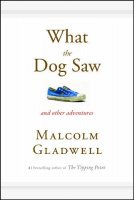 What the Dog Saw, by Malcolm Gladwell (Little, Brown & Co., New York, 2009)
What the Dog Saw, by Malcolm Gladwell (Little, Brown & Co., New York, 2009)
Malcolm Gladwell may not always be right—in fact I'd lay odds that he's often wrong, or at least oversimplifying complex problems—but he's always interesting, and always gives new insight into what we don't know about what we thought we understood. What the Dog Saw is another eclectic collection of the same, covering topics as various as ketchup, the Challenger disaster and how our quest for increasing levels of safety is making the world more dangerous, hair coloring, the Enron scandal, the difference between choking and panicking, the problem of homelessness, the problem of intelligence (both as in spying and as in genius), copyright, and the deleterious health effects for modern women of ovulating and menstruating markedly more than was the norm in most times and places throughout history.
What the Dog Saw is well worth reading. In some ways it reminds me of one of my favorite books, Peter Drucker's Adventures of a Bystander. They're not the same thing at all, but both introduce us to remarkable people with remarkable ways of thinking about the world.
I'll close with just one quote, the one that reminds me not to assume that Malcolm Gladwell knows everything he's talking about.
Taleb was back at the whiteboard. Spitznagel was looking on.. Pallow was idly peeling a banana. Outside, the sun was beginning to settle behind the trees. "You do a conversion to p1 and p2," Taleb said. His marker was once again squeaking across the whiteboard. "We say we have a Gaussian distribution, and you have the market switching from a low-volume regime to a high-volume. P21. P22. You have your igon value." He frowned and stared at his handiwork. The markets were now closed.
Sometimes I wonder if I should have majored in English rather than math in college. No, I don't. I would have been bored to tears and torn my hair out in frustration as an English major. Nonetheless, in paragraphs like this I rarely think about whether or not the math makes sense—unlike my son-in-law, whose brain can't ignore such errors. My brain is more attuned to language, and immediately perked up at "Igon value." There was something odd about it. I might simply have dismissed it as something related to finance about which I knew nothing and cared less, but the mere act of pausing made me pronounce the phrase in my mind. "Oh!" I realized. "He means eigenvalue." Mind you, I can now barely tell an eigenvalue from an iceberg, but I knew immediately that (1) Gladwell's field is not math, or any science that depends on math, and (2) his proofreaders/editors don't know math either. (Or just missed it. As a writer, proofreader, and editor myself, I know that these things happen.) All of this to say, if you're going to write about subjects you don't clearly understand (and we all do that), it's important to have a proofreader who can judge content as well as grammar, spelling, and punctuation.


